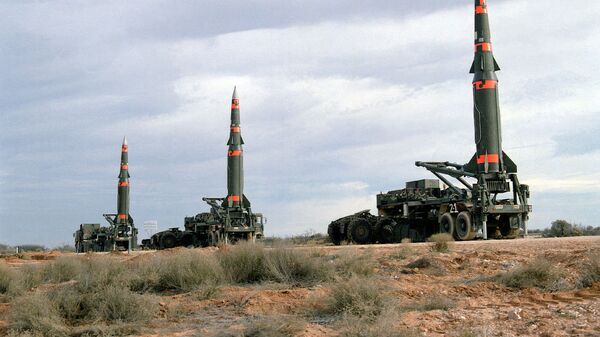Mello, who heads the nuclear watchdog Los Alamos Study Group, joined Loud & Clear on Radio Sputnik from New Mexico on Friday to discuss Washington's notification to Moscow that it plans to withdraw from a landmark nuclear arms control treaty.
"Technically, the US is ‘suspending' its participation in the treaty, but this may be a distinction without a difference. As the Russians say, I think there's little doubt that the intent is to withdraw from the treaty," said Mello.
"The United States will feel free to pursue development of INF-violating missiles, which is something that many parts of the military-industrial complex and Congress have wanted to do for some time," he noted.
"There has been already a law passed requiring research into INF-violating missiles, but the extent to which that research has actually been done is still fairly black," meaning that it is done in secret outside typical military protocol, Mello said.
Specifically, a defence policy law signed by US President Donald Trump in 2017 provided $65 million in funds for a cruise missile program with a range prohibited by the INF Treaty, Sputnik reported.
"Now the lid can be taken off that," he said. "And the applicability of these missile is often mentioned in the Western Pacific region."
The Arms Control Association (ACA) blasted the missile program when the 2018 National Defense Authorization Act was about to be signed, saying it would "deal a major, if not mortal, blow to longstanding bipartisan arms control efforts." (ACA also lamented the 2018 NDAA's lack of funding for oversight on the rising costs of the $1 trillion plan to "upgrade US nuclear forces.")
US Secretary of State Mike Pompeo announced on Friday that Washington will "suspend its obligations" under the Intermediate-Range Nuclear Forces (INF) Treaty of 1987 "effective February 2nd."
After lodging a formal complaint about what the US side claims is Russia's lack of compliance with the INF Treaty in early December, there was a 60-day period during which the US had given its first notice to Moscow and European nations about removing itself from the treaty signed by then-General Secretary of the Soviet Union Mikhail Gorbachev and then-US President Ronald Reagan. On Friday, that 60-day period came to a close.
"We will provide Russia and other treaty parties with formal notice that the United States is withdrawing from the INF Treaty effective in six months, pursuant to Article 15 of the treaty," Pompeo said during a call with reporters Friday.
The Russian side has also alleged violations of the treaty by Washington. "They are always looking for any of our violations, but are consistently doing this themselves," Russian Federation President Vladimir Putin said in December 2017, noting that scrapping the treaty reduces the level of security in Europe and around the world.




